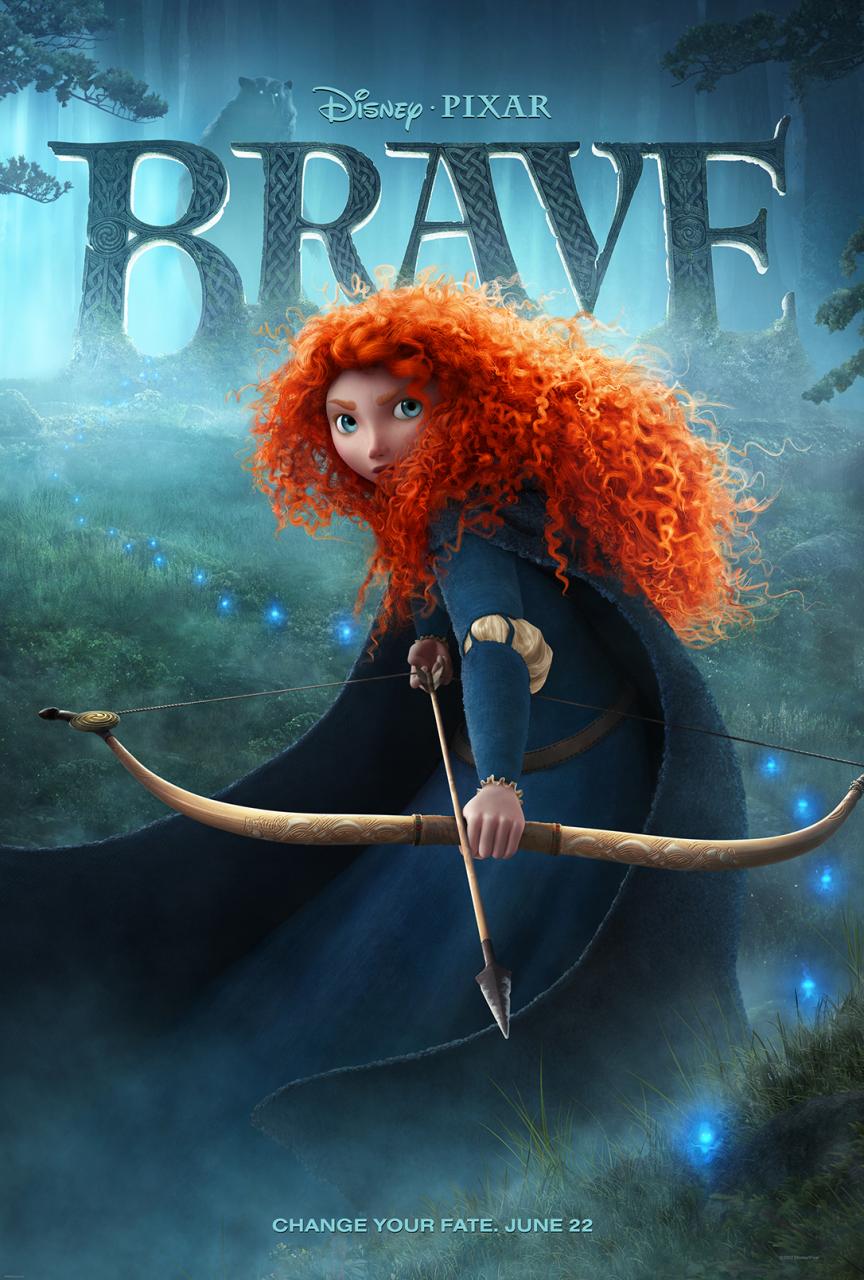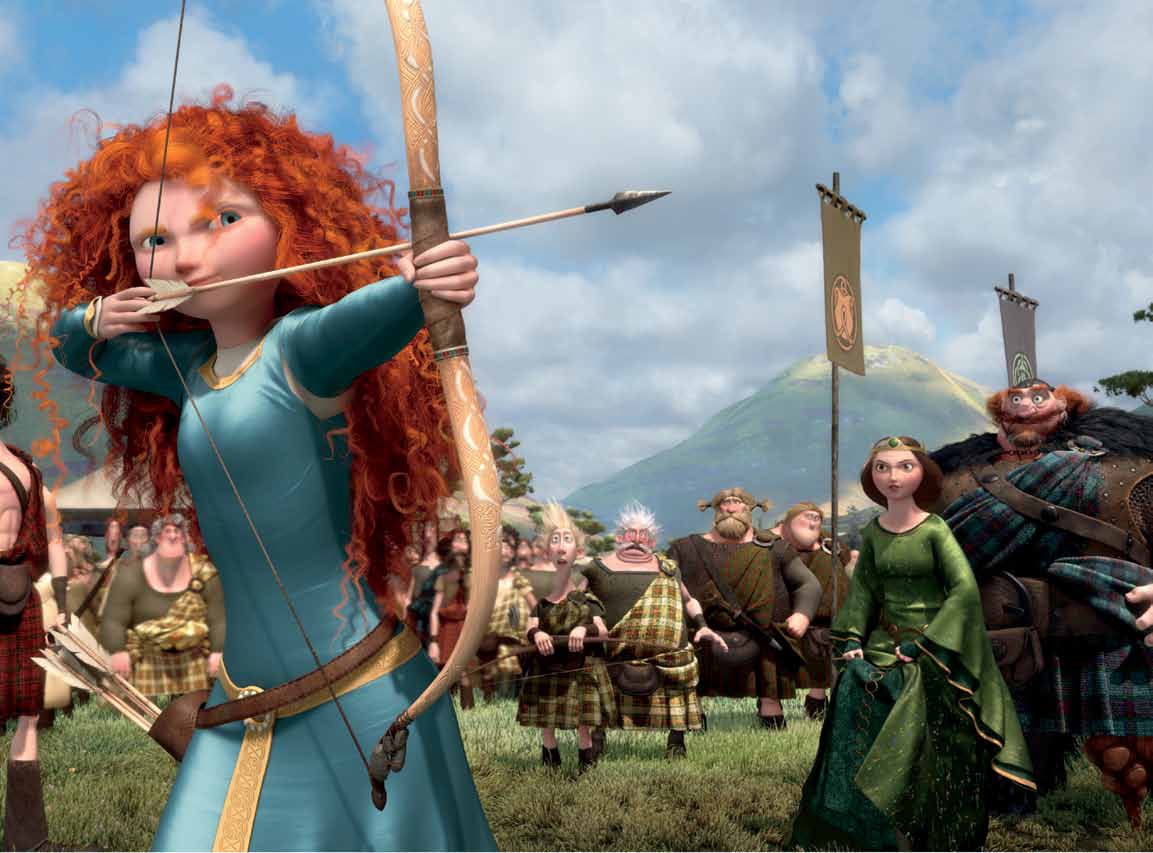

Director: Mark Andrews, Brenda Chapman and Steve Purcell, 2012 (PG-13)
Brave brings a
number of firsts from Pixar: their first fairy tale; their first film with a
female lead, and a princess at that, and a first use of their new animation
system, and a beauty it is. This is a visual feast, a wonder of color that
shows us a depth and detail not seen before. We see every lock of Merida’s long
red hair flowing in the wind as she rides her horse through the forest. Indeed,
this Pixar film feels like a Disney film, a Snow White perhaps, which is not
surprising since Disney owns Pixar. Not as good as some of their recent
Oscar-winners, yet Brave is a solid add to the portfolio.
The film is set in medieval Scotland, a rugged land of myths
and legend. We meet the young Merida (voice of Kelly McDonald) as she is a tot,
even then picking up a bow to shoot arrows. Her brutish but teddy bear dad,
King Fergus (voice of Billy Connolly), adores her and gives her whatever she
wants, including a wee bow for her small frame to handle. Her mother Queen
Elinor (voice of Emma Thompson), on the other hand, wants her daughter to be a
prim and proper princess, learning the arts and charms necessary to be married
to a Lord. And there are three other little red-headed kids scurrying around as
well. In the early scene, Fergus loses a leg in a quick battle with a legendary
bear who escapes but will haunt Fergus’ nightmares from then on.
Cut ahead a dozen years and Merida is a feisty princess with
long red hair. A tomboy, she rides to the forest to practice her archery since
she cannot do it in her palace. She wants nothing more than to live wild and
free. But her mother has other ideas. She (and Fergus) have invited the three
first-born sons of the three fighting tribes to come to a feast and competition.
The winner of the competition will earn Merida’s hand in marriage. This, of
course, is not in Merida’s plans. In one scene she declares, “I want my
freedom!” And the Queen answers, “But are you willing to pay the price your
freedom will cost?”
 This first theme, freedom, echoes that of another famous
film centered on a Scot: Braveheart. We all want freedom, it seems. When we are
trapped into plans we have no control over, we rebel. We want out, as Merida
does. But can we really gain our freedom? From what? And at what price?
This first theme, freedom, echoes that of another famous
film centered on a Scot: Braveheart. We all want freedom, it seems. When we are
trapped into plans we have no control over, we rebel. We want out, as Merida
does. But can we really gain our freedom? From what? And at what price?
We are all trapped, slaves indeed. In fact, we are born that
way slaves to sin (Rom. 6:16). As such, we cannot escape to freedom on a white
horse without some help. That help comes from Jesus Christ, the sinless Savior
who took our place on the cross (1 Pet. 2:24). The price he paid for our
freedom was his very life. And he now offers us his life and the true freedom
that comes in him (Jn. 8:36).
But what price did Merida face? Her mother had her path
defined for her and her fate was sealed. So, Merida followed some magical will
o’ the wisps to a witch’s home deep in the forest. A typical Disney trick, the
witch concocts a magic spell to change her mother. But it is more than Merida
bargains for, and it really does change her mother. And it changes her fate, as
it changes Merida’s fate.
Fate is the second theme, one popular in this genre. Merida
comments at one point, “If you had a chance to change your fate, would you?”
Her rhetorical question implies an affirmative answer. Later she says, “There
comes a day when I don’t have to be a Princess. No rules, no expectations. A
day where anything can happen. A day where I can change my fate.” And she
completes this thought later in the film: “There are those who say fate is
something beyond our command. That destiny is not our own, but I know better.
Our fate lives within us, you only have to be brave enough to see it.”
The theme here is that we can control our destiny, we can
change our fate. But it is a humanistic philosophy that denies the existence of
God. But he is there and he is sovereign, having created all things (Acts
4:24). Moreover, he has a purpose for his creation and he has predestined those
who follow Jesus to be conformed to Christ (Rom. 8:28-30). There is still a
tension between the free will of man and the predestination of God, but fate is
not something that lies simply inside of us.
The second part of the film recounts how Merida and Elinor
are forced to work together to undo the unwanted effects of the spell. Where
before Elinor would not listen to Merida (and there is a great scene of a
family dinner where she pays no attention to the princess), now Elinor cannot
communicate to Merida though she desperately wants to. Merida has made a bad
choice and it is having terrible, possibly permanent effects. It culminates a
terrific fight sequence that sheds new light on the mama bear protecting her
cubs analogy.
The final theme emerges: making bad choices. We all make bad
choices, and they all have consequences. Some are minor and momentary. We drink too much one night and face a
splitting headache the next day. Some are monumental and permanent. We drink
too much and drive, and crash our car killing someone. We face prison.
Choices may carry consequences, but forgiveness covers sin.
God knows our choices. After all, he is all knowing. And he has provided a way
for our sins to be forgiven, even forgotten. Once we repent and turn to Christ
(Acts 2:38), his blood covers our sins. We may still have to face the human
consequences of our sinful choices, but we can know that God has forgiven us
(Mic. 7:18).



No comments:
Post a Comment